| Srl | Item |
| 1 |
ID:
104443
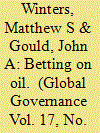

|
|
|
|
|
| Publication |
2011.
|
| Summary/Abstract |
Can international donors ensure that poor countries spend their natural resource revenues on development? This article reviews the Chad-Cameroon Oil Pipeline Project and the World Bank's fourteen-year effort to foster pro-poor expenditure of resource revenues in Chad. The World Bank used its leverage as a gatekeeper of private sector oil investment to write fiscal restrictions and extragovernmental oversight into Chadian law. These efforts, however, were not sufficient to overcome the country's poor governance and weak political accountability. The article argues that external donor efforts to build better governance in undemocratic states are unlikely to overcome resource curse and obsolescing bargain dynamics. They may even do more harm than good. The article recommends that the World Bank implement the 2003 Extractive Industry Review suggestion to cease investing in oil production. If the Bank does continue to lend to countries like Chad, it must ensure that it retains leverage across the life of the project in order to achieve its goals.
|
|
|
|
|
|
|
|
|
|
|
|
|
|
|
|
| 2 |
ID:
104445
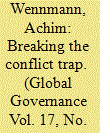

|
|
|
| 3 |
ID:
104438
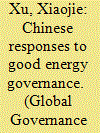

|
|
|
| 4 |
ID:
104436
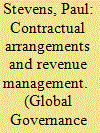

|
|
|
| 5 |
ID:
104437
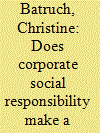

|
|
|
| 6 |
ID:
104435


|
|
|
|
|
| Publication |
2011.
|
| Summary/Abstract |
The global governance of extractive resources has largely been shaped by the energy-security agenda of industrialized countries. It is patchy and does not properly address the specific concerns of producer, consumer, and transit countries. Rising demand coincides with a looming peak of oil production and climate change. This requires urgent and resolute collective action, which is hampered by a disconnect between geological and political temporality and realities. Extractive industries, investors, civil society, international organizations, and consumer countries can jointly provide significant political and market incentives to avert the resource curse in resource-rich, but weak states. This calls for an appropriate institutionalization of voluntary multistakeholder initiatives with greater engagement on the part of emerging economies.
|
|
|
|
|
|
|
|
|
|
|
|
|
|
|
|
| 7 |
ID:
104444
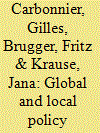

|
|
|
|
|
| Publication |
2011.
|
| Summary/Abstract |
This article examines the most significant international policy responses that seek to address the resource trap and spur development in resource-rich, but fragile states. It applies a regime theoretical framework to assess recent multistakeholder initiatives within the extractive sector by focusing on the processes through which they seek to alter the behavior of public and private organizations. Based on a review of the Nigerian and Azeri cases, the article finds that civil society often does not have the capacity to live up to the high expectations placed on it by these initiatives. The effectiveness and eventual success of multistakeholder initiatives in the extractive sector require exploring alternative pathways to affect behavior of key actors. Stronger market incentives and regulation can provide the conditions required for extractive activities to result in positive development outcomes.
|
|
|
|
|
|
|
|
|
|
|
|
|
|
|
|
| 8 |
ID:
104439
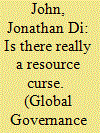

|
|
|
|
|
| Publication |
2011.
|
| Summary/Abstract |
This article provides a critical survey of the resource curse-the idea that mineral and fuel abundance generates negative developmental outcomes in less developed countries. In particular, it examines the idea that mineral and fuel abundance generates growth-restricting forms of state intervention, extraordinarily large degrees of rent seeking, and corruption, which are generally argued to be negative in terms of the developmental outcomes they generate. The analysis surveys the Dutch disease, rentier state, and rent-seeking versions of the resource curse and finds they have significant shortcomings in terms of theory and evidence. It also identifies some decisive factors that help determine the blessing threshold-below which the risk of a resource curse may be very high-in mineral and fuel abundant developing countries.
|
|
|
|
|
|
|
|
|
|
|
|
|
|
|
|
| 9 |
ID:
104442
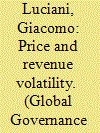

|
|
|
|
|
| Publication |
2011.
|
| Summary/Abstract |
Price volatility is a major problem for all commodity exporters because it translates into direct or indirect volatility of government revenue. Should a developing country's state be responsible for isolating the domestic economy from the consequences of fluctuating international commodity prices? This article argues that this is an essential function of the state and a crucial component of its legitimacy. Recently, the establishment of stabilization funds has been regarded as an essential component of good governance, notwithstanding the persistence of major problems. As an alternative, this article proposes the use of resource revenue for establishing endowments of autonomous public institutions with well-defined developmental goals, or furnishing the equity for strategically important commercial corporations. The latter opens the door to an interesting perspective on the potential path toward progressive democratization of the rentier states.
|
|
|
|
|
|
|
|
|
|
|
|
|
|
|
|
| 10 |
ID:
104440


|
|
|
|
|
| Publication |
2011.
|
| Summary/Abstract |
The so-called resource curse raises moral issues. Who, if anyone, is morally responsible for it? This article argues that this question amounts to: who is blameworthy for the violations of people's property rights? The international oil companies are blameworthy for the violations of property rights only in the case of complicity, not in the normal purchase case. Yet the international community has to take action against massive violations of property rights. The article discusses different measures, and criticizes voluntary initiatives such as the Extractive Industries Transparency Initiative for not making the states accountable to their people. In this line of thought, it argues for an extension of the mandate of the International Criminal Court: massive violations of property rights should be prosecuted at the international level.
|
|
|
|
|
|
|
|
|
|
|
|
|
|
|
|
| 11 |
ID:
104441
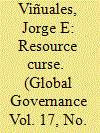

|
|
|
|
|
| Publication |
2011.
|
| Summary/Abstract |
This article analyzes the different dimensions of the so-called resource curse hypothesis from the perspective of international and domestic law. The analysis is structured as a commentary of the views of the UK-based philosopher Leif Wenar and the Swiss philosopher Peter Schaber on this issue. The article concludes that, under current legal arrangements, states remain the main guarantors of the public good of the people living under their sovereignty. Thus, for better or worse as long as, from a political or an ethical standpoint, peoples are sovereign, they will also continue to assume the main responsibility for their own development even when their house is not in order.
|
|
|
|
|
|
|
|
|
|
|
|
|
|
|
|